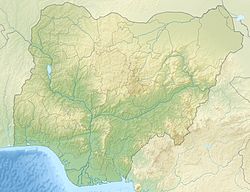
Back أسابا Arabic آسابا AZB Asaba Catalan Asaba (kapital sa estado sa Nigyeriya) CEB Asaba Danish Asaba (Nigeria) German Asaba (Niĝerio) Esperanto Asaba Spanish آسابا Persian Asaba Finnish
Asaba
Ahaba | |
|---|---|
 Okpanam Road, a prominent avenue in Asaba | |
| Nickname(s): Ani Mmili, Asb | |
| Coordinates: 6°11′N 6°44′E / 6.183°N 6.733°E | |
| Country | Nigeria |
| State | Delta State |
| LGA | Oshimili South |
| Founded by | Nnebisi |
| Government | |
| • Asagba “Igwe” “Obi” (Ceremonial) | Prof. Epiphany Chigbogu Azinge |
| Area | |
• City | 268 km2 (103 sq mi) |
| Elevation | 55 m (180 ft) |
| Highest elevation | 201 m (659 ft) |
| Lowest elevation | 40 m (130 ft) |
| Population (2006 census)[2] | |
• City | 149,603 |
• Estimate (2011) | 176,060[1] |
| • Density | 560/km2 (1,400/sq mi) |
| • Urban | 500,000 |
| Demonym | Asaban |
| Time zone | UTC+1 (West Africa Time) |
| Climate | Aw |
| Website | asaba |

Asaba[3] (Igbo: Ahaba) is an Igbo[4] town and the capital of Delta State, Nigeria. A rapidly growing urban area, it is located on the western bank of the Niger River, in the Oshimili South Local Government Area.[5][6][7] Asaba had a population of 149,603 as at the 2006 census,[2] and a fast growing metropolitan population of over half a million people.[8][5]
In some respects, Asaba and neighboring Onitsha in Anambra form a continuous metropolitan area. The First and Second Niger bridges form the boundary between Delta and Anambra with the Niger's relatively centralized location in this region recognizing it as the geopolitical border between Eastern and Western Nigeria.
In October 2023, Asaba joined the UNESCO Creative Cities Network and was named a UNESCO City of Film.[9]
- ^ "Delta (state, Nigeria)". population.de. Retrieved 25 July 2016.
- ^ a b "Federal Republic of Nigeria: 2006 Population Census" (PDF). Archived from the original (PDF) on 5 March 2012. Retrieved 25 July 2016.
- ^ Isichei, Elizabeth Allo (1997). A History of African Societies to 1870. Cambridge University Press. p. 249. ISBN 0-521-45599-5. Retrieved 13 December 2008.
- ^ Isichei, Elizabeth (22 January 2009). "Historical Change in an Ibo Polity: Asaba to 1885". The Journal of African History. 10 (3): 421–438. doi:10.1017/S0021853700036367. Retrieved 29 September 2024.
- ^ a b Cite error: The named reference
asaba.com/aboutwas invoked but never defined (see the help page). - ^ "Asaba Progressive Union". www.asabaatl.org/about.html. Archived from the original on 7 May 2016. Retrieved 22 April 2016.
- ^ Okenwa Nwosu (Igbo Focus) (2 January 2014). "The Politics of Second Niger Bridge". www.igbofocus.co.uk. Archived from the original on 6 December 2015. Retrieved 21 April 2016.
- ^ "A History and Tradition". Asaba Online. Asaba Progressive Front. Archived from the original on 15 September 2007. Retrieved 19 June 2007.
- ^ "55 new cities join the UNESCO Creative Cities Network on World Cities Day". Retrieved 8 April 2024.
